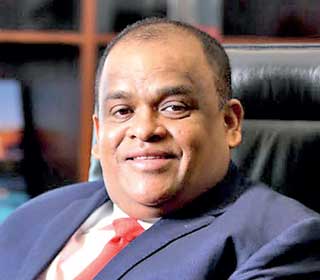Sunday Feb 15, 2026
Sunday Feb 15, 2026
Monday, 10 January 2022 00:28 - - {{hitsCtrl.values.hits}}
By Nisthar Cassim
 |
| Dhammika Perera
|
Business leader and one of the biggest investors in the real economy Dhammika Perera yesterday shared seven key initiatives which in his belief would boost Sri Lanka’s foreign reserves on a sustainable basis to $ 11 billion per annum.
Separately, Dhammika also opined that the Government could approach the IMF for support on two conditions – not to do away with tax concessions for new investments and allow Sri Lanka to continue with a managed float of the rupee.
He suggested setting up a higher education zone close to the Bandaranaike International Airport with five international recognised and graded universities, each catering to 30,000 local students as well as 25,000 foreign students, as a key measure to boost forex reserves.
According to him 25,000 Lankan students go overseas annually for studies and each student spends $ 30,000 per year, resulting in a combined outflow of $ 750 million annually and $ 2.25 billion collectively annually for them and others going on their second and third year. “The proposal of setting up five universities will ensure retention of this amount as Lankan students will still get internationally recognised degrees. Such an offering will also attract students from South Asia to pursue higher studies in Sri Lanka, thereby ensuring an inflow of $ 2.2 billion per annum,” Dhammika pointed out.
His second proposal is to encourage an influx of budget airlines as done by Thailand, Singapore, Malaysia and Vietnam, thereby boosting tourist arrivals. Colombo can also be positioned as a hub for budget carriers. This move, Dhammika believes, will bring in $ 2 billion in extra foreign exchange earnings.
To ease off the demand for IT, software engineering and programming qualifications in the State university system, Dhammika said private sector IT institutes must be allowed to increase their intake and these students be subjected to exams in State universities every six months. This initiative, he opined, could produce 200,000 IT qualified students and jobs over five years, boosting export income from ITC services by $ 2 billion from the present $ 1 billion.
Another initiative mooted by Dhammika to boost reserves was by expanding the coconut sector. He said that enhancing the new planting from the current 1.5 million saplings by another four million annually would ensure a rapid expansion in the coconut sector. “Within five years via of this initiative the country would have planted 20 million saplings ensuring a crop of an additional 1.2 billion nuts, thereby boosting coconut and coconut-related industries prospects to increase export income by $ 600 million in five years,” Dhammika explained.
Positioning Sri Lanka as a world class healthcare hub on similar lines of Singapore is another proposal from Dhammika. He said that the Government could set up two more world class hospitals with international accreditation and draw $ 100 million income from foreign patients, as well as save $ 100 million spent by Sri Lankans seeking healthcare from overseas.
A wider use of Sri Lanka’s marine resources is another proposal by which Dhammika believes the country can increase foreign exchange earnings by a further $ 1 billion. He said deep sea fishing could be promoted by doubling the use of boats and helping medium to small scale fishermen with satellite and GPS technology and equipment. He pointed out that Indians harvest 20,000 kilos of fish in a nautical square kilometre whereas Sri Lanka’s catch is only 900 kilos.
Dhammika’s seventh proposal is linked to his condition to the IMF – retain if not enhance tax concessions to new investments by both foreign and local enterprises and individuals in addition to taking measures in parallel to go up in the Doing Business Index. “I am confident this initiative alone will draw new investments to the tune of $ 2-3 billion,” Dhammika added.
He stressed that if the Government comes up with a definite and credible plan with practical measures to boost foreign exchange earnings in the short to medium term, confidence on the part of global investors, businesses and rating agencies would certainly improve, leading to an upgrade in the sovereign rating of Sri Lanka.